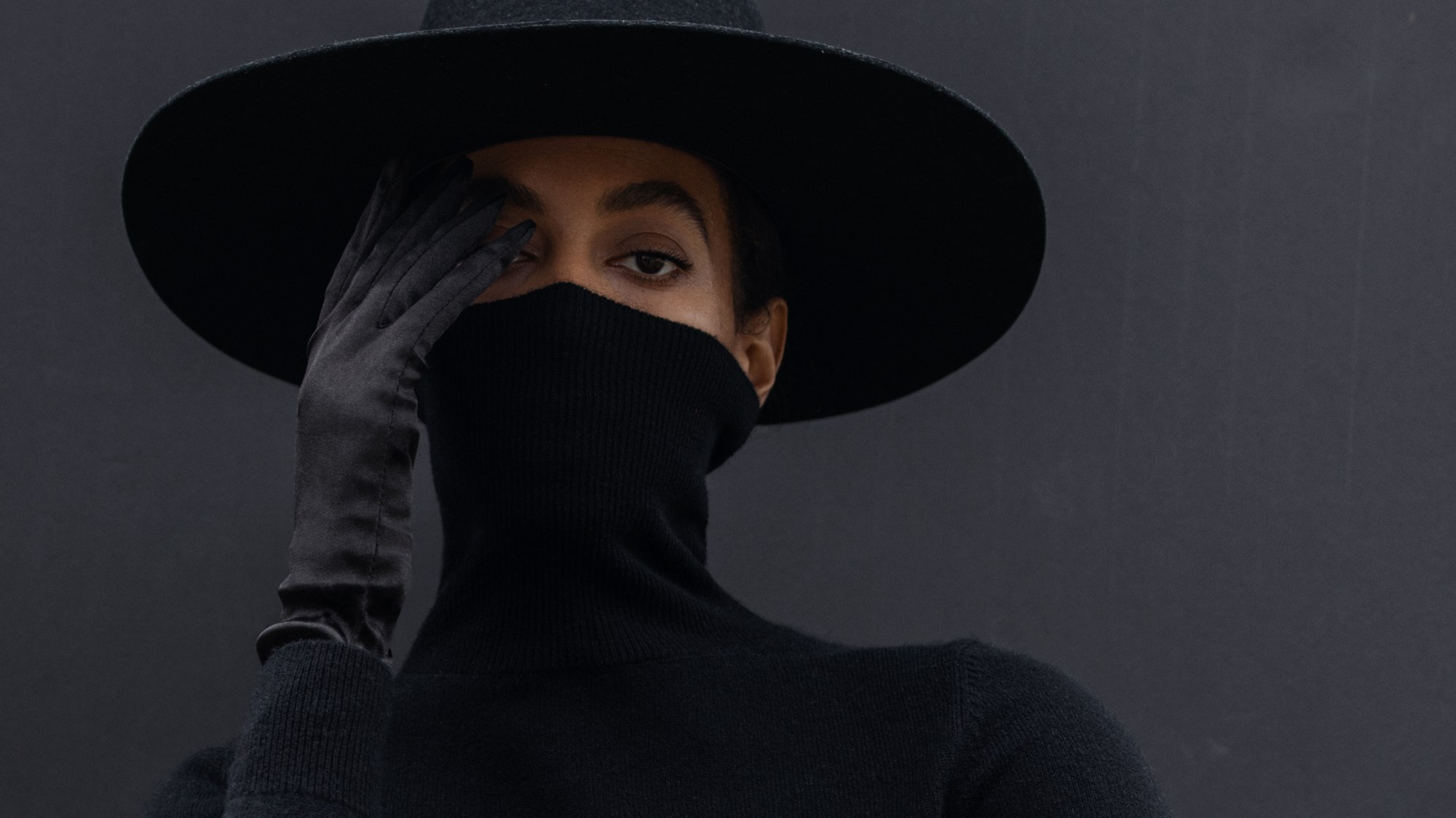This is a condensed version of the full story available in i-D’s The Homegrown Issue, no. 355, Spring 2019. You can order it here.
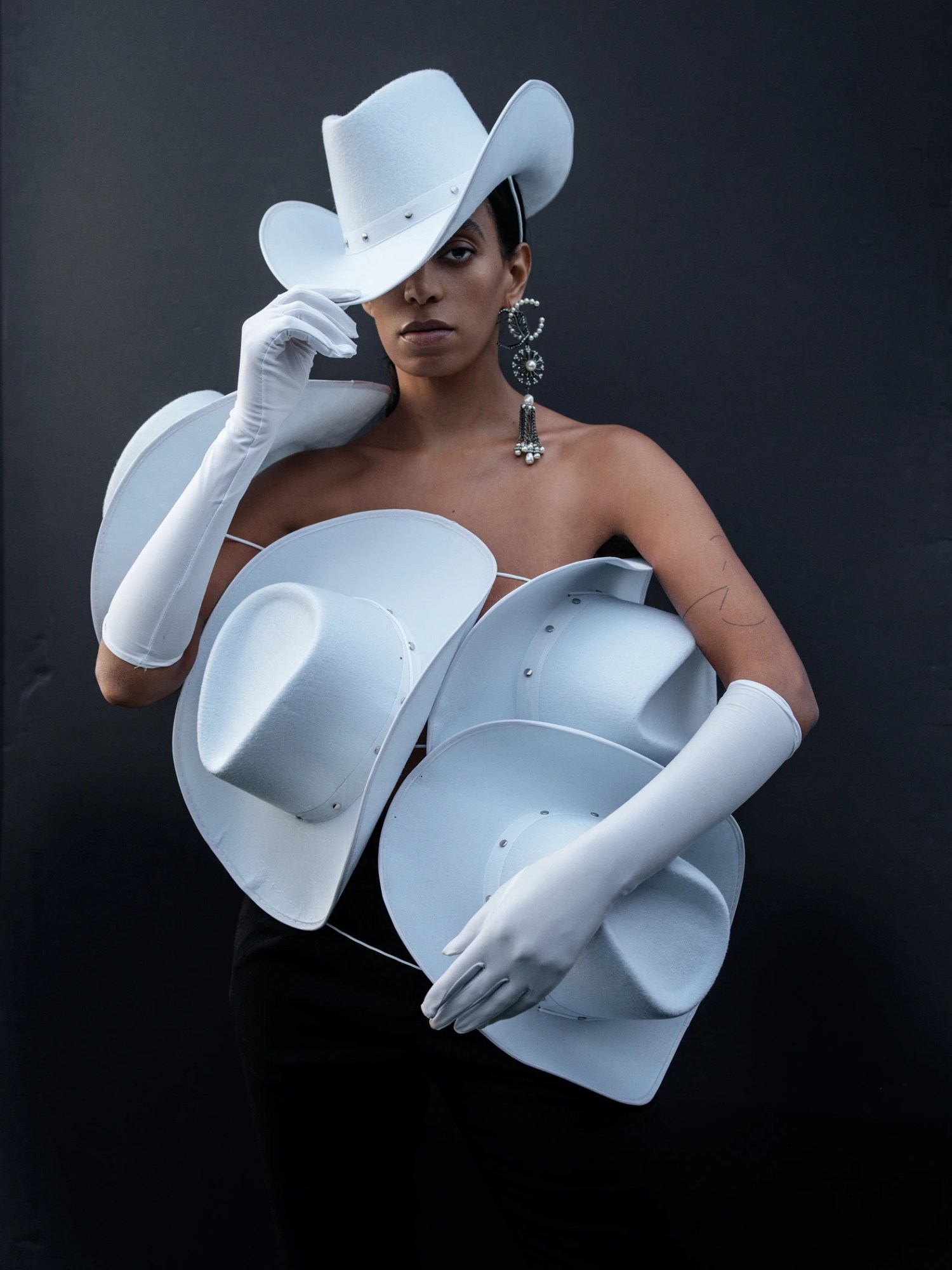
Solange Knowles was born on a day astrologists call the Cusp of Magic – the moment when Cancer and Gemini merge. It makes sense to me – you never know what to expect from Solange, but you know it will be beauty-filled, trill, and slightly enigmatic.
It’s the day after Christmas in Houston, Texas, and I’ve arrived to a panoramic view of a misty skyline. I am anxious. I find myself pacing my hotel floor. What should make our hang simple actually makes it a daunting endeavour – I call Solange a friend. But she is also, well, Solange. And I’ve been charged to write about her. She’s a genius Grammy Award-winning singer-songwriter-visual artist, determined to share her origin story and human experience, specifically as a Black southern woman. I know there’s no white page that can capture her full vibrancy , but I need her to be seen.
My thoughts are interrupted by a text from Chris Kauffman, Solange’s right-hand man and childhood friend, “About to come scoop you to roll with us.”
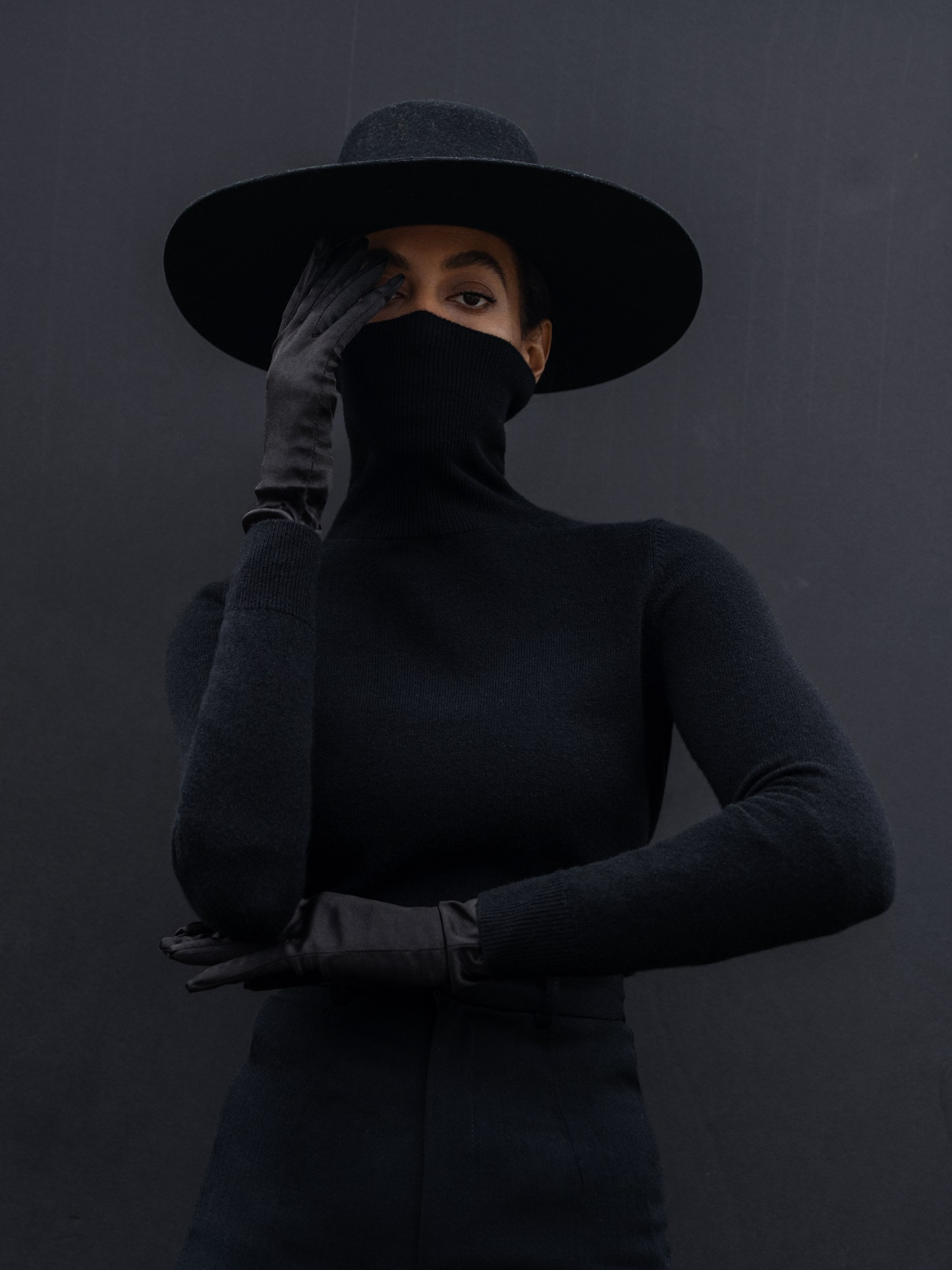
Legacy
“I been through the storm and it turned me to a G.” Solange is teetering between rapping 21 Savage “a lot” and pointing out markers of Third Ward yesteryear. She peeks over her shoulder. “We’re passing Project Row Houses, where I recorded a lot of my album.” She’s referencing her highly anticipated fourth studio album, When I Get Home. Fans have been waiting with bated breath since a mysterious snapshot of her in a black cowboy hat (a nod to her Texas roots), cold-shoulder top and signature full brows beside the text “Solange coming” made its way around social media last year.
Her last album, the critically acclaimed A Seat at the Table, certified her as a bonafide popstar, a serious performance artist, and gained her countless accolades: Harvard University Artist of the Year, Glamour Woman of the Year, Billboard Impact Award, and honoured at the 70th Annual Parsons Benefit, in collaboration with The New School for her iconic fashion. It was a dream journey that she’d worked her entire career for and she notes that every one of those mind-blowing moments led her back here, to Houston, Texas, to herself.
To know Solange is to understand that she is Prince-level private. She will go missing from social media for months at a time, choosing not to have an avatar for her Instagram account. She does not permit pictures of her son on the internet, and she founded and runs a progressive creative agency, Saint Heron, where she leaves other artists of colour as the focal point.
Visiting Houston’s Third Ward, all the pieces come together and I come to understand how she’s consistently remained true to herself in an industry that often tries to box artists in. The centering of community and excellence is tradition here. I find myself emotional as I process growing up in a similar neighbourhood, Titusville, in Birmingham, Alabama. Far too often, as a people, we do not have exclusively Black places and things. But here there are reminisces of Phylicia Rashad’s voice, Debbie Allen’s footwork, her mama’s hot comb through women’s
hair with stories to tell, majestic ebony hued cowboys, the sluggish, laconic sounds of DJ Screw and a little brown-bodied girl who never dreamed she could not because she was surrounded by everyday examples that she could and would make her ancestors proud.
“Here we are, y’all” Solange announces as the car slowly comes to a stop. We are parked on the Menil Collection acreage. Houston’s iconic art museum where she proudly debuted SCALES last year, a performance piece she composed and choreographed as an extension of the conversation between Black women and men she commenced on her former album. In the rain, Solange hurries ahead, childlike in her trot to the octagonal Rothko Chapel on the adjoining campus, while Raquel and I opt to hunch under my not-large-enough umbrella, trying to keep our fresh flat-ironed edges in place. A place of worship and an art installation, once inside, I am unsure of where we are. It feels otherworldly, and out of both reluctance and intrigue I stick close to Solange.
“I’ve been coming here since I was 14,” she says. We find ourselves on a long, wooden bench surrounded by stunning black-dark hued paintings by Mark Rothko, and intense silence. She stays by my side awhile before breaking off to sit on the floor facing the wall. The chapel features a saintly skylight that seems to fall perfectly over her shoulders and highlight her pensive, pecan face.
I’m reminded of the spiritual side of Solange’s identity. Beyond the bottle of Florida Water in a crystal-netted bag that accompanied her at the 2018 Met Ball Gala, the meditative structures that have become synonymous with her artistry. Behind the soul-searching lyrics she has consistently penned since her first album, Solo Star, to the groundbreaking visuals that never fail to unlock another realm of understanding, is a real person who does the excruciating work of fighting through the dark and pulling in the light. Every moment of elation or aching we’ve felt from her body of work – she’s had to experience it first.
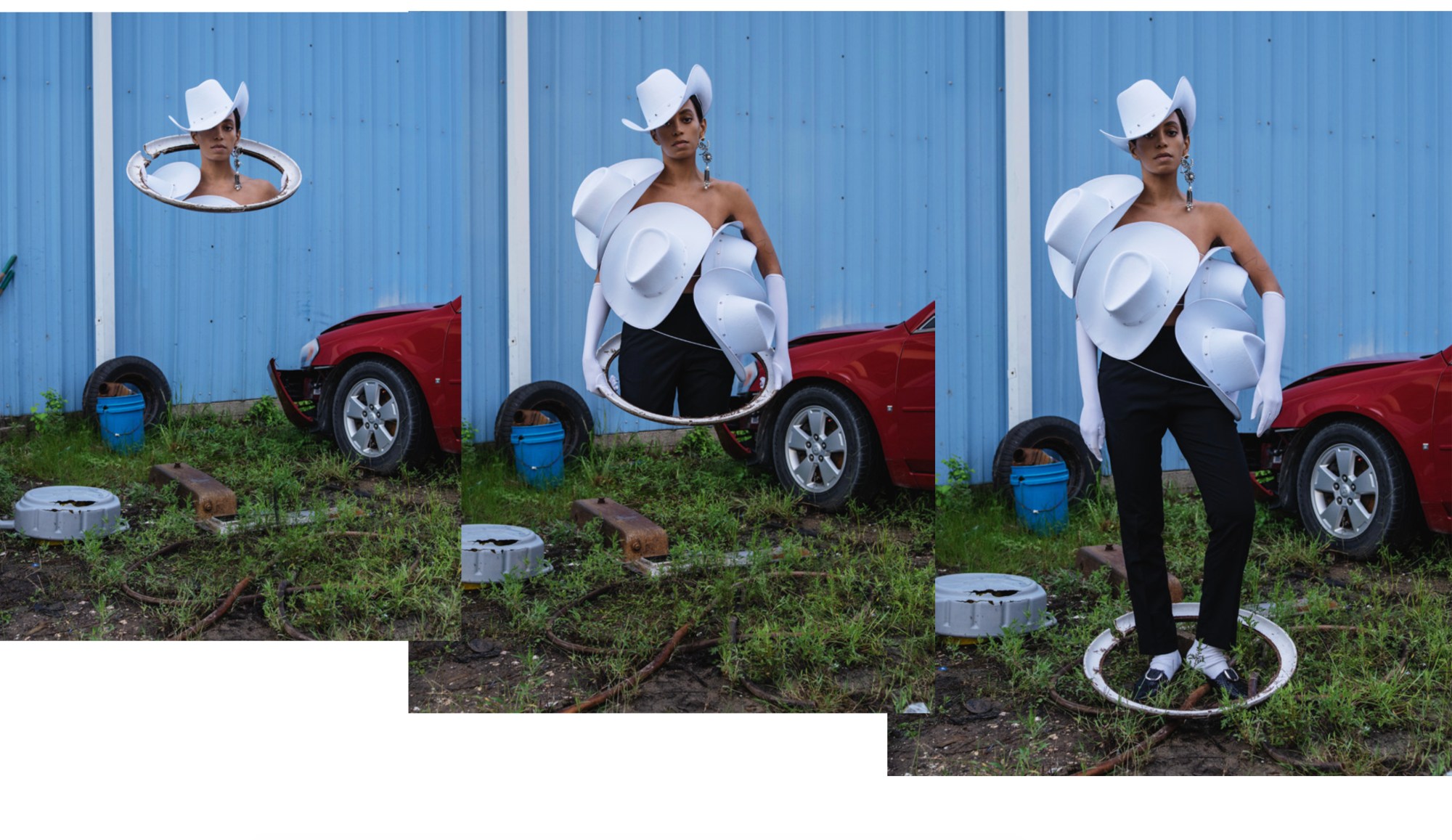
Blackness
Despite the rain, Solange suggests we walk a few feet up to the Menil Bookstore instead of getting back in the car. We slip inside the quaint shop without being identified, but I know it’s short lived. Solange is now casually thumbing through their small but notable collection. She pauses to look at Blackness in Abstraction by Adrienne Edwards. “Oh this is right on time. Toyin [Ojih Odutola] was just speaking about blackness as a default in an art world where whiteness is constantly the default. Why is there an insistence on white walls and white paper?”
I can see her mind processing faster than she can talk. She flips a few pages before adding the book to her pile and pausing to stare at another featuring a pencilled self-portrait by the American artist and philosopher Adrian Piper. I catch her enchantment and say, “My good friend was taught by her, said she was a real gem, and wild.” She quickly turns her head toward me, “For real? Wow! Yes. I loved her calling cards. My friend said I needed to make my own and pass them out at these magazine shoots so people know what’s up.”
We both laugh, but know it isn’t so funny. I think of her having to tell the Evening Standard Magazine “dtmh” after they edited out her golden braided crown without consent. The woman who wrote the piece asked for her name to be removed from the by-line in solidarity. Needing full control of her narrative and body, every published piece per her request has been written by Black women she trusts, including herself. Snapping me out of my thoughts, Solange says, “I fucks with Adrian Piper. She my type of chic!”
We head toward check out. The clerk, a middle-aged Black woman, asks us to please wait, but changes her tune once she catches a glimpse of Solange’s face. “Oh, I know who you are! You certainly don’t have to wait,” she sings. Solange smiles. “We’re good. We’ll wait our turn.” Sifting through books, Solange thinks aloud. “I’ve been trying to figure out what makes home feel like home…” Before finishing her sentence, she spots a new book, A Treasury of African-American Christmas Stories. After skimming she slides the small hardback my way, “This has your fave Nikki!” I blush at her recalling that Nikki Giovanni has been one of my most beloved writers since childhood. I think about how much books do create a sense of home, both in tangible spaces, and inside of oneself.
We now have the full attention of the clerk. “Finally! How are you today? Glad to have you back home.” Solange’s widens her grin. “Ah, thank you, sis. It’s always good to be here!”
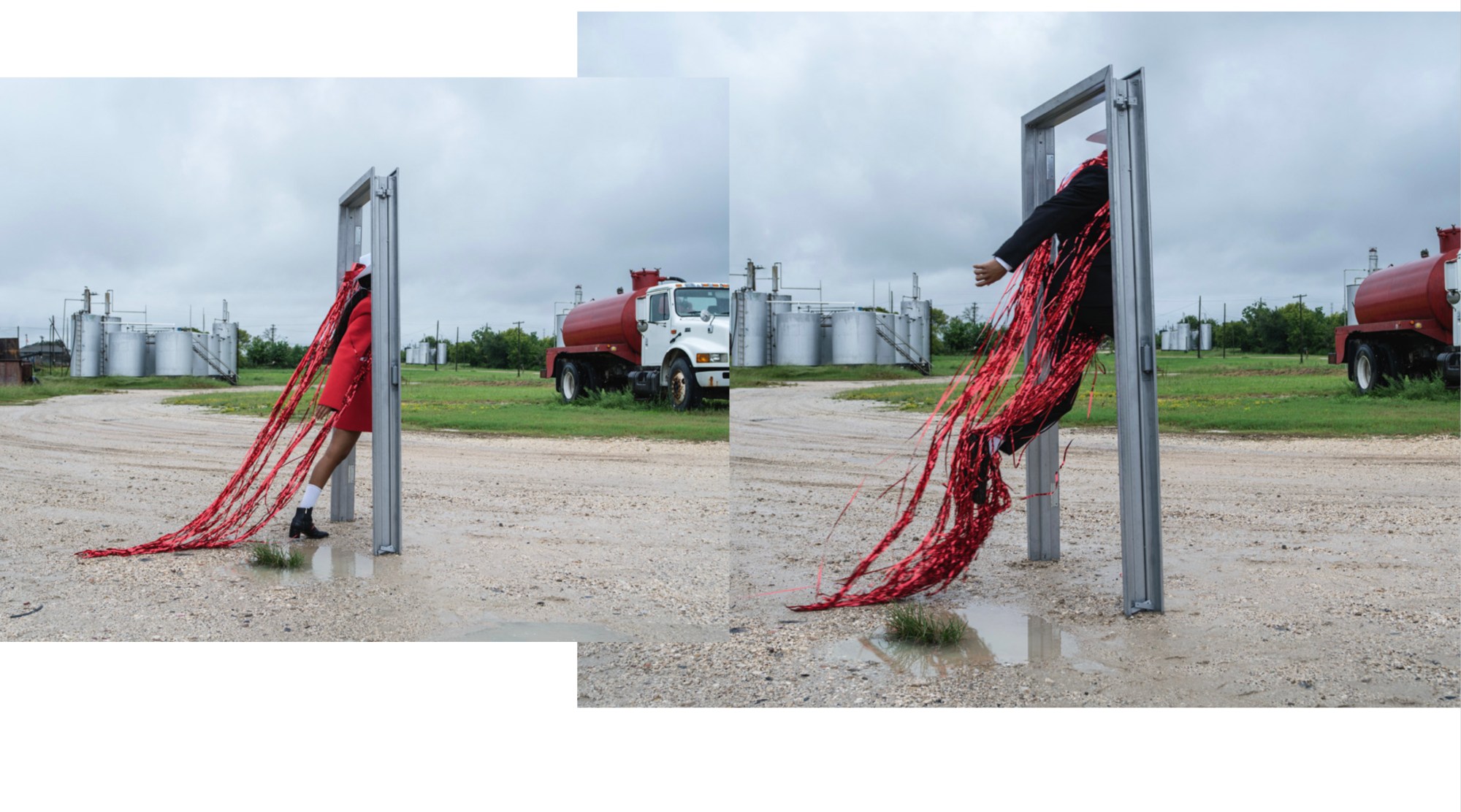
Surrender
Solange went to the mall while I listened to, When I Get Home. When we met back up to discuss it, Chris opened the back door of a quaint apartment where I found Solange dancing. Music playing at full volume while Solange and Raquel snickered like schoolgirls, I laugh and say, “Of course y’all are dancing,” and they collapse, Solange into the couch and Raquel into an adjacent chair.
I tell her that the album reminds me of The Wiz – not in sound, but feeling. The journey back home to oneself is not for the faint of heart. It is filled with both light and darkness. It is both theatrical and introspective.
To better understand the journey that led her to this album, I ask after touring sold-out shows throughout America and Europe—what brought her back to Houston. She bends her head to the left. “Over the last couple of years I’ve thought a lot about origin. How much we’ve taken with us versus how much we’ve left behind and a lot of that had to do with coming home and working out the answer to that spiritually through and around me. Coming off my last shows performing A Seat at the Table, my body was not responding how I wanted it to, and I think it’s interesting how your body can tell you what you need to do at a present time.”
In 2017, Solange announced she was treating an autonomic disorder, and with any unexpected ailment, you’d expect a bit of despondency, but her new album is anything but. It is triumphant, sensual, euphoric even. I am interested in how the last two years has brought her to this feeling and sound.
She slides back into the couch a bit. “Going through a transition where things were happening to my body that were out of my control, I got to the place where there was no fear surrounding my body, and it belongs to me in a whole new way. It’s been a beautiful love affair that took me time. I’ve always been connected to my sexuality and sensuality, but so much of that was re-grounded during this time. The freedom I got to feel was amazing. I learned you can create those spaces; you don’t need anyone else to have your moment.”
Freedom is an interesting concept to explore, especially as a Black woman, and I wonder what that looks like for her at this time. On one of the tracks her laughter is so robust; I was enthralled. She responds, “I had a fucking blast creating this album! I really wanted to create a space for joy and expression. My last record was deeply personal, but it was no secret that I was working through a lot of shit. I was carrying a lot of weight and even though that’s something that doesn’t go away, I also feel like a lot of answers felt more inward this time and not outward. A Seat At The Table was composition, a thesis, and a healing experience, but I couldn’t ask the world to be involved in the answers I needed for this project. I just needed to live in it.”
While the album does have the meditative synergy of A Seat at the Table, which Solange attributes to recording her new album, while performing her last, it brings a different dynamism, and I want to know if the way the music was made influenced the final product. “Absolutely! What I love so much about recording this record was most of the songs are one-takes. We’d start from the top with me singing a melody and building out chords, just me and click track and then my boy John Key on the drums or keys and John Kirby on the synths. I would then go find the best three minutes of the fifteen. I actually tried to recreate some of my vocals, but the energy wasn’t the same and I had to surrender to that. This album isn’t about vocal performance or just words out loud. I tried to create everything I had to say with sonics and frequency. This is really about the way that I feel. Feelings.”
She then reveals that she was in a jazz band when she was 17. “Our band was low key trash, but we had heart! I reunited with a few of them on this album which pushed me to step it up because they are used to improv and having that much access to all the chord structures in my mind felt so incredible. At every turn and corner they were with me. It was so freeing and fun!”
I asked Solange how she feels now that the album’s about to be released. She beams. “I feel so good! The energy that’s in this album is an exhale and a celebration of the last two years of my evolution. Everything came from such a special place because we were creating songs that really embody living.”
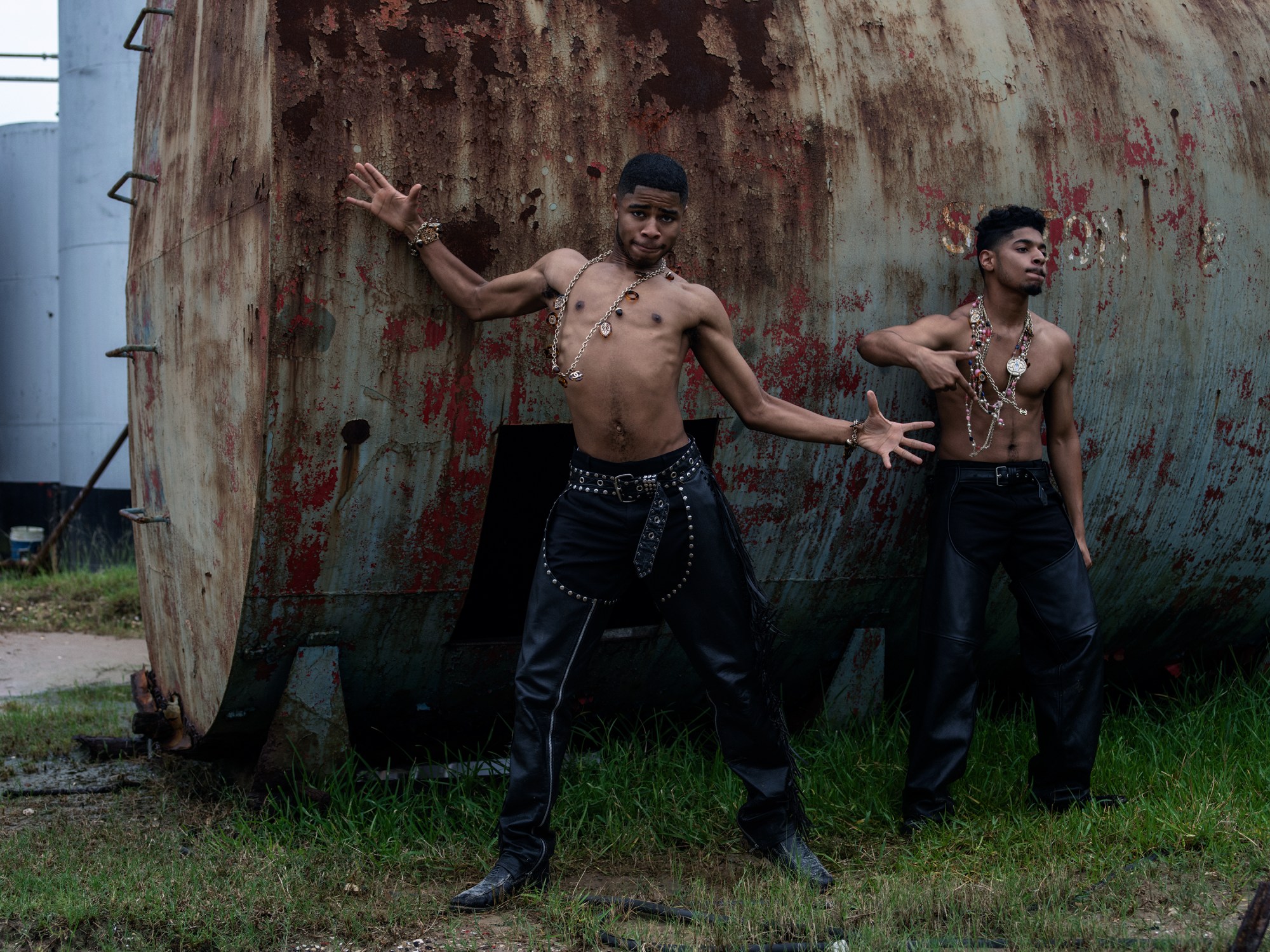
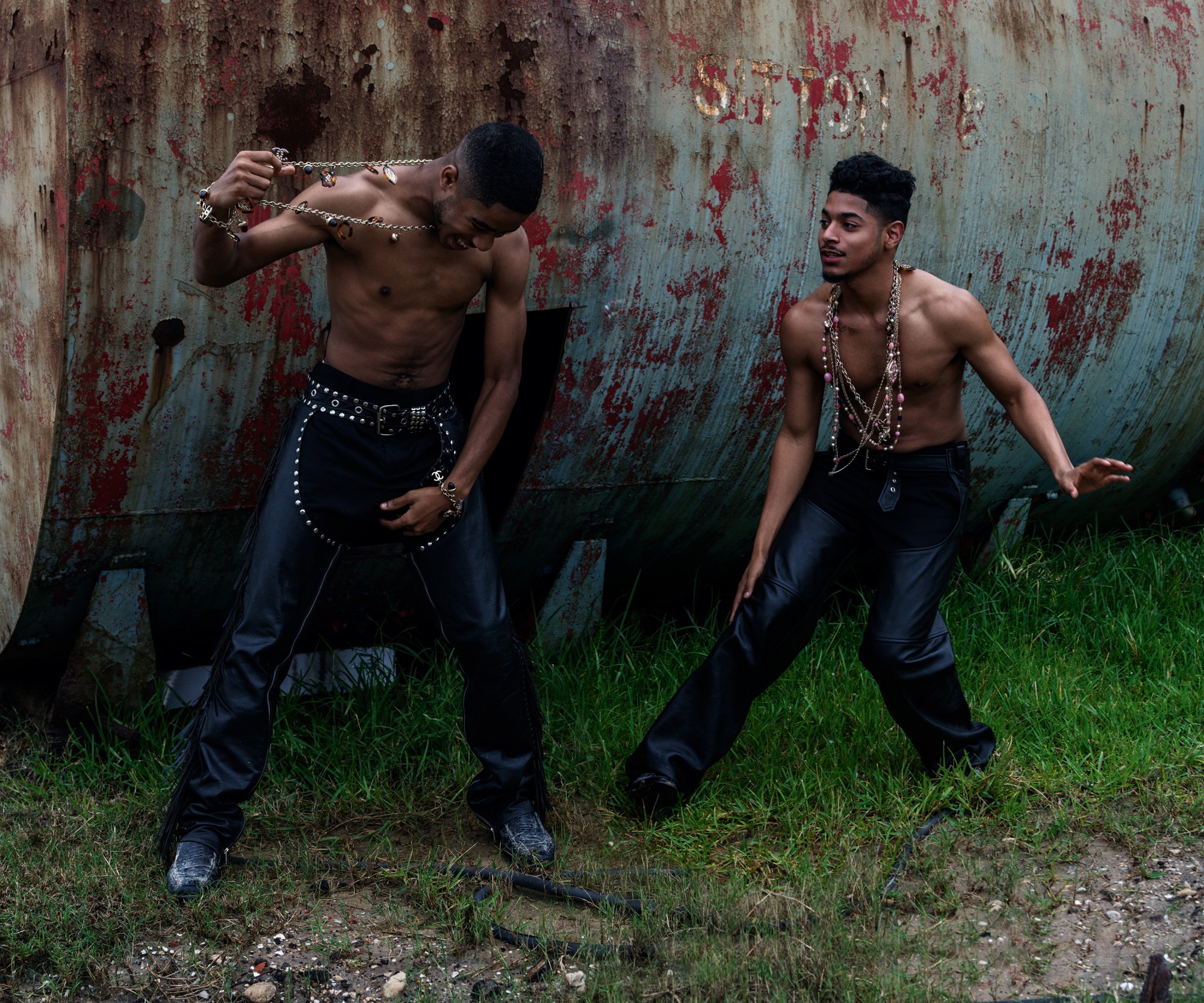
Witness
In the weeks that followed our visit to Houston, I kept coming back to a Toni Morrison quote I like, “The truth lies in our midst, in our songs, that’s where the seeds are. It is not possible to constantly hone on the crisis. You have to have the love and you have to have the magic. That’s also life, and I regard it even though it may sound as though I’m dealing in fantasy, I don’t think so I find it all terribly realistic because I regard my responsibility as a Black writer as someone who must bear witness, someone who must record the way it used to be. I want to make sure the little piece of the world that I knew doesn’t get forgotten.”
A lot of who we are, as a people, is wrapped up in some form of heartache, but there’s more to our individual and collective story. We cannot forget the full-bodied laughter, dreams, deep friendships, and victories and how it has shaped who we have dared to become. Solange’s voice echoes in my mind: “I can come home at any given time and know some shit is just going be the same. I feel very tuned in here. Very comfortable being myself. Loved.”
Can you imagine what bearing witness to a loving existence that makes you wholly comfortable within your skin can do? Perhaps it’ll help us hold our head a little higher and envision new worlds where we bring the best of us to and for future generations. And just like that, Solange is ahead of the pack, charging the path, yet again.
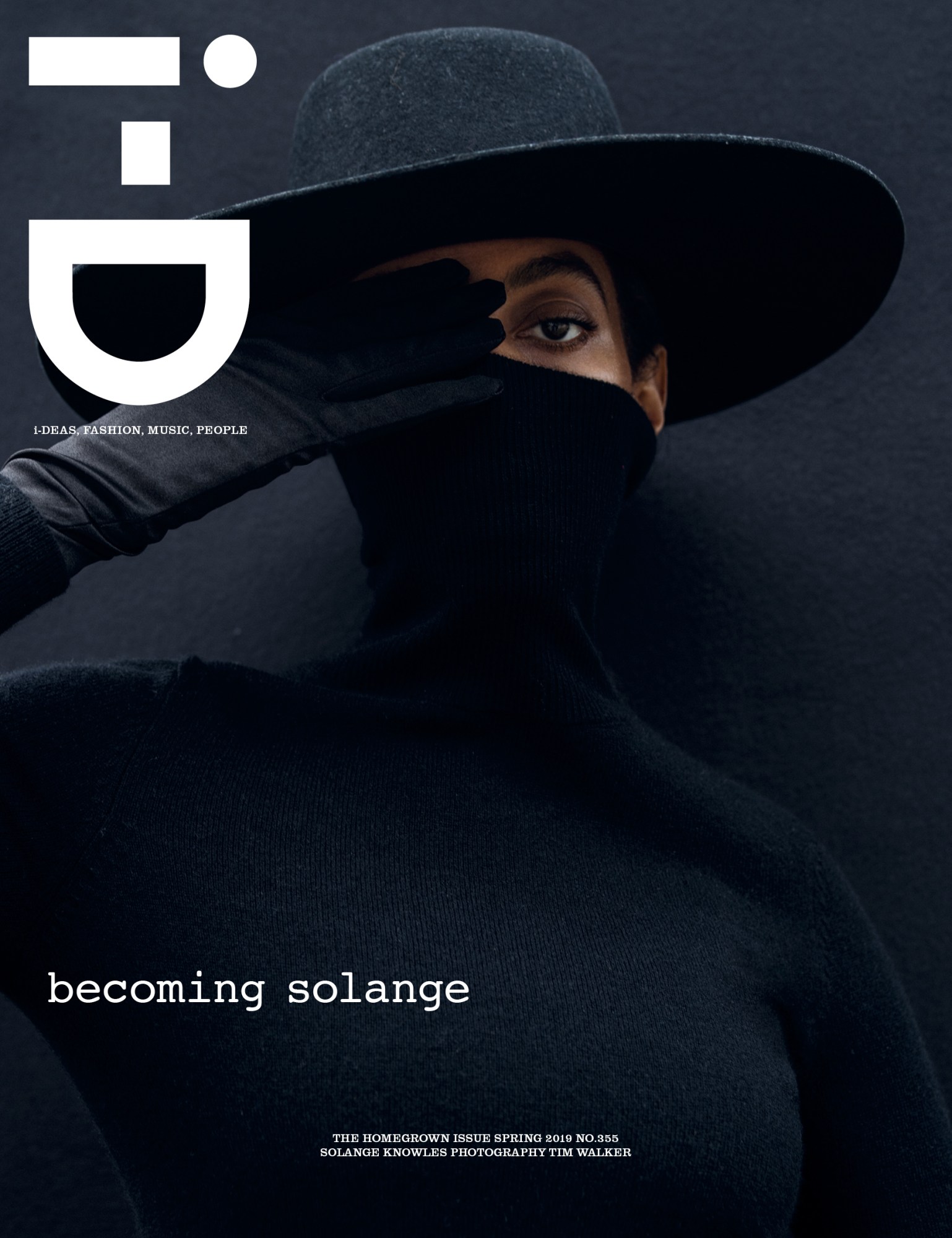
Credits
Photography Tim Walker
Styling Ibrahim Kamara
Hair Virginie Pinto Moreira at St Lukes using Sebastian Professional. Make-up Sam Bryant at Bryant Artists. Photography assistance Sarah Lloyd. Digital technician Matthew Coats. Styling assistance Gareth Wrighton, Ola Ebiti, Sasha Harris, Nafisat Raji and Yuriko Takiguchi. Make-up assistance Claudia Savage. Production Jeffrey Delich at Padbury Production. Models Khalil Mcneil. Eric Harleston.
